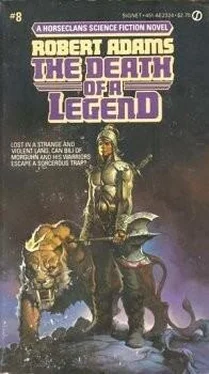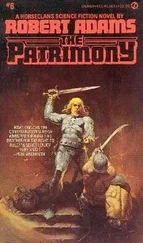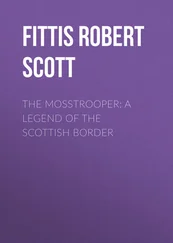Once more the prince sighed gustily. “We all, even our Elmuh and his gentle ilk, have come at last to the hard conclusion that the only sure way to rid these mountains of ours of these deliberately primitive, deliberately backward, fanatically hidebound and stubborn cannibals will be to extirpate them with steel and fire wherever and whenever we find them.
“There is no reasoning with the vast majority of them. My father and his father tried that tack for long, frustrating years. These Ganiks have no honor, sworn oaths mean nothing to them, and all are mentally unstable to one degree or another. Furthermore, without the replacement pool formed by these scattered but numerous families, the raider bands of outlaws soon could be wiped out—completely and for all time.”
“The ‘Ganeek’ women and the children, too, you would slay, Prince Byruhn?” demanded Rahksahnah, the gaze of her black eyes burning intensely into his blue-green ones.
The big man shrugged. “Nits make lice, my lady. Those children are weaned on human flesh, you know; as for the Ganik womenfolk, they are even more vicious and fanatic than their menfolk. Those harpies it is who do the inhuman torturing of any helpless wight captured by the men; they are the ones who roast the quivering flesh of the living bodies of prisoners and then force the poor wretches to eat of themselves.”
Bili noted that both Vahrohneeskos Gneedos and the hardbitten Lieutenant Brakit looked a mite greenish, and he felt a trifle queasy himself; but the Ahrmehnee headmen and Rahksahnah just looked grim, with jaws firmly set and eyes hard—they had heard rumors of such horrors for all their lives.
After a long draft of the ale to settle his stomach, Bili asked bluntly, “And this is what you want me and my force for, Prince Byruhn? To help you to wipe out these Organikahnsehrvaishuhnee?”
Byruhn nodded shortly. “Partially, young sir, partially; but we’ll not really need to kill too many of them. When once they know that we mean business and that we at last have sufficient force to carry out my will, they’ll move on—move farther south or west, but out of my lands, at least. Their doleful songs tell of many such moves over the years; it would appear that no normal folk will tolerate their presence for any long time. Nor can anyone blame those who drive out or eject such a mad and maddening people, I trow!
“But there is a second reason, a reason far more important than helping to rid our lands of these Ganiks, cousin Bili. You and your disciplined, well-armed veterans are of immense value here in the southeast, but of even more in the northwest, round and about New Kuhmbuhluhnburk, where sits my father, in great jeopardy.
“Know you, young cousin, that we are gravely threatened in the northwest of the kingdom by a migrating tribe of folk from across the northern river, from the mountains of Ohyoh. Although suffering immense losses in so doing, they overran the northernmost of our safe glens some years agone, and now are they using it as an advance base against us, raiding deep and ever deeper into our lands. Their announced goal—or so say their heralds, for unlike these accursed Ganiks, they at least follow civilized modes of daily affairs and war—is to drive out my house and all our folk and to then take over for themselves all of our lands and places. They seem to know of the Ganiks of old, say that it was their own forebears who drove them south, and have solemnly promised to exterminate them this time around, then push on eastward and drive the Ahrmehnee, too, from their lands. They are a most martial and determined people; were they not so deadly a threat to me and mine, I could easily find much reason to admire them.”
A deep, menacing growl rumbled from the two Ahrmehnee headmen, and Rahksahnah fingered her dagger hilt. But the prince seemed neither to hear nor see and continued on.
“If I could have drawn support from the cannibals—who are no less threatened by these invaders than are mine and me—or if I could have depended upon them and the raiders they breed and harbor to have not precipitated a border war or to have not laid siege to this or other safe glens, the northerners might have been thrown back before they were become so powerful. But with the ever constant need to guard my back with my slim forces, I dared not meet large bodies of them in open battle, and so I lost the initiative, and lands to boot.
“Further, there has been and still is much turmoil in the lands north of the Ohyoh, the lands whence these invaders came, so each six-month sees them reinforced with more fighters—good fighters, too.”
The massive warrior brooded for a moment, rolling a ball of bread between his horny thumb and finger. Then he spoke again.
“A third reason for your value to us all, Cousin Bili, is the Prophecy of the Kleesahk—of the Teenéhdjook, rather, since they had it before they came south and began to breed with the northern Ganiks. It… but, wait, let Elmuh tell it, he can do it far better than can I.”
In a booming voice which rose even above the hubbub from the lower tables, a voice that, indeed, shut off all noise in the hall as a driven bung halts the flow of wine from a pipe, he roared, “Elmuh! Come up here and tell these guests of the Prophecy given your race of old.”
Hari of Krooguh idly stroked the down-soft fur of the prairiecat cub snoozing in his lap. He sat on a flat-topped rock near the mouth of that same mountain cave which had sheltered him and his hosts throughout the long, bitter months of the winter just past.
Far, far below his perch, the tiny stream of autumn days was become a rushing, turbulent flood of snow-melt waters from off the higher elevations and mountains. Beyond that stream, on a small plateau, the horses grazed avidly on fresh, tender green shoots of grass, guarded from depredation of lean wolf or hungry bear or prowling treecat by several of the adult prairiecats, whose lounging gray or brownish forms Hari could see here and there.
He could see them. With his own pale-blue eyes could the old man see them, and he could but consider this fact to be a true miracle. Nearly two hundred years old—as true men reckon time—Hari of Krooguh had been stark blind for more than one hundred and fifty of those years. Yet slowly, during the long months that he had wintered here with these strange but gentle giants, these Teenéhdjook, his sight had returned to him.
Another cat cub wandered out, blinking in the splash of bright sunlight after the dimness of the cave’s interior, and the “sleeping” cub in Hari’s lap suddenly came to life and full wakefulness. He gathered his legs beneath his tense little body, his ears laid flat back against his neck and his foot-long tail twitching. When his unsuspecting littermate ambled within easy range, the sometime sleeper’s hindquarters swayed rapidly from side to side once, twice, thrice; and then he launched himself onto and full-tilt into his sister, and the two cubs commenced to roll over and over on the sun-warmed ledge—snarling and spitting, growling and clawing and biting with their small, sharp teeth. The enraged growls the two emitted seemed far deeper and more menacing than such small animals could possibly produce.
At last, the attacked female wrenched herself free of the tangle and stood for a moment—stiff-legged, broadside to her attacker, her own small ears laid back and the soft fur fluffed up high along the line of her spine, her tail swishing and her white fangs bared at the crouching male cub—before flinging herself back into the fray.
Hearing the joyful sounds of the combat, first one, then another of the prairiecat litter trotted bouncing out onto the ledge to lend their own weight, teeth, claws and abundant vitality to the ongoing fracas. Hari sat and watched, grinning and chuckling, until at last all four cubs lay panting or preening their ruffled fur in the sun.
Читать дальше












